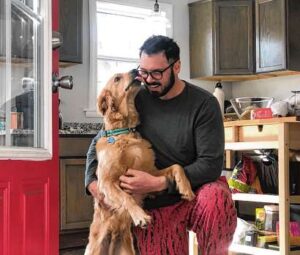DAYTON DAILY NEWS Photo and Story by Cornelius Frolik
Home ownership increases to 71.4%, its highest on record.

Matt Wilcox at home with his dog in the South Park neighborhood. Wilcox says he bought a home because it was cheaper than renting downtown.
Strong home sales last year helped the Dayton region’s homeownership rate climb to the highest level in at least 35 years and possibly much longer, according to a Dayton Daily News analysis of Census survey data.
The Dayton metro area’s homeownership rate increased to 71.4%, according to data from the U.S. Census’ Housing Vacancies and Homeownership survey. Since the mid-1980s, Dayton’s homeownership rate had never exceeded 69%.
“We did see a continued desire to buy homes into the pandemic,” said Julie Deacon, executive director of the HomeOwnership Center in Dayton. “We thought the demand would decrease with financial hardships.”
Dayton’s homeownership rate was the 11th highest in the nation among the 75 largest U.S. metro areas. The Dayton metro area includes Montgomery, Miami and Greene counties. But the local housing market still has some challenges and continues to have one of the highest homeowner vacancy rates in the nation.
The five-county region saw record home sales last year, and the real estate market rebounded quickly after sales dropped in April and May as Ohio went into lockdown, said Dayton Realtors president Sharon Geier.
Total home sales last year were up 4%, and average price, median price and sales volume all increased, according to data from the Dayton Realtors. About 17,305 home sales occurred in 2020 in Montgomery, Greene, Preble, Darke and Warren counties, Geier said. “Homeownership is critical to the region’s economy,” she said. “Plus, homeownership gives a sense of community … that rentals do not.”
Cheaper to buy
Matt Wilcox, 27, said he decided to buy a home last year on Oak Street in the South Park neighborhood because it was cheaper than renting a downtown apartment. His monthly mortgage is hundreds of dollars less than what some of the downtown apartment complexes charge for rent.
Wilcox and his girlfriend moved to Dayton from Chicago so she can attend medical school. Wilcox said owning a house with a yard during the coronavirus crisis was a big relief because they have spent 95% of their time at home.
“It’s really nice to have a lot more space,” he said. “We were in a small, 500-square-foot, one-bedroom apartment in Chicago. “Now we have a 1,500-squarefoot, three-bedroom home.”
Purchasing a home last year felt a little risky, Wilcox said, because of the economic uncertainty. But he said he felt comfortable taking the plunge because he had a healthy savings. He also put his first stimulus check toward his down payment.
U.S. lawmakers have approved three rounds of direct stimulus payments that most Ohioans have or will receive. Most people received checks worth $1,200, $600 and $1,400.
Some residents who did not suffer financial hardship during the pandemic put their stimulus money toward buying a home, said Deacon, with the Home- Ownership Center. Many households also have spent less money in the last year, meaning they had more money for housing costs, Deacon said.
“They were no longer going out to eat, going to movies, going to outside entertainment, no child care expenses,” he said. Deacon also said the Memorial Day tornadoes of 2019 likely had an impact on homeownership.
A significant number of rental properties were destroyed by the storm, she said, and those former tenants might have had more home purchase choices than rental options. Additionally, she said, many people displaced by the tornadoes were offered homeowner incentives, including down payment assistance.
Homeownership builds household wealth for owners and future generations, and communities are better served when homes are owner-occupied instead of operated as rentals by outof-town investors, said Steve Naas, president of County Corp, which is Montgomery County’s private nonprofit that seeks to increase affordable housing.
Home prices have increased in the Dayton area but remain below the national average, Naas said, and often it’s cheaper to buy. He also said it is a seller’s market right now because inventory is tight.
Homeownership is important to neighborhood stability because homeowners often are deeply involved in their community and look to improve and increase the value of their homes, which benefits the tax base, said Jim McCarthy, president and CEO of the Miami Valley Fair Housing Center Inc.
Homeownership is the primary way that most people and families accumulate wealth and increase their net worth, he said.
But the Dayton region still struggles with blight and many homes are empty and deteriorating.
The Dayton metro area had the third highest homeowner vacancy rate in the nation last year, among the large metro areas (2.3%). The homeowner vacancy rate is the share of the homeowner inventory that is vacant for sale.
Contact this reporter at [email protected].
Related posts
Wayne Avenue Traffic Safety Coalition gets results!
WATSC has been relentless in their months-long campaign for the creation of a safer stretch of Wayne Avenue through the busy, pedestrian-heavy South Park business district. The results: a completed ODOT study and a safer street design on the drawing board.
Year in Review: Our hard-working neighborhood improvement council accomplished plenty in 2024
From neighborhood safety, to playground improvements, to tackling nuisance properties and our usual social and volunteer activities, 2024 was another busy year for South Park.
The next phase of Flats at South Park construction to begin Spring 2025
More development coming to the west side of South Park. Phase 3 of the Flats at South Park construction project to being in Spring 2025.
